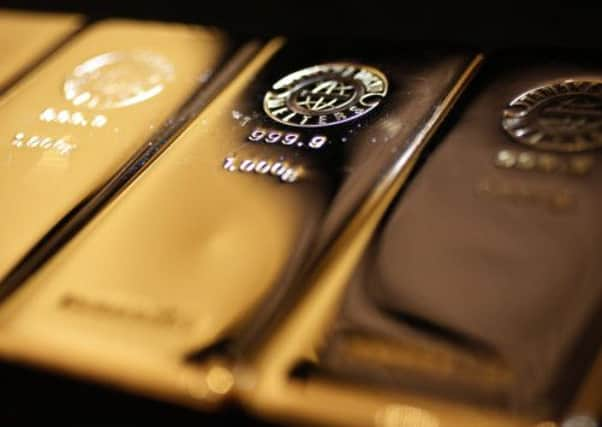Peter Bickley: Why gold does not glister as a rational strategic investment


Having been not far off $2,000 for a single troy ounce, it has skittered off to a recent low just above $1,300. That’s the sort of move that has contrarians champing at the bit. Surely if something falls that far and fast the asset – suddenly so unloved – must be cheap. Well, maybe, or maybe not.
When it comes to gold as an investment, rather than something that helps computers to work and looks rather nice on that finger, nothing is quite what it seems.
Advertisement
Hide AdAdvertisement
Hide AdInvestment specialists have long regarded gold as a portfolio diversifier. It is usually somewhere in the mix, accompanied by some mumbo-jumbo about “store of value” and “historic covariance”. Which is all good fun but also, sadly, mainly bunk. I’m allowed to say this, because I was one of those specialists and I, too, always liked to have gold in the mix. I, too, used to dream up impressive rationales for its inclusion – until, that is, I got honest and admitted that I just wanted to see it there even though I could not explain why.
At somewhere in the mid $1,400s, now the price of gold is demonstrably lower than it was, but that does not necessarily make it any cheaper. Only when you start to think about what an ounce of gold should be worth do you realise that there is no absolute, objective answer. Industrial applications of the metal tend not to be overly price-sensitive, given the difficulties of substitution. Domestic Indian demand for gold as jewellery and as a “store of value” does ebb and flow with the price, but those Indians are price takers – they do not generally determine the level.
Gold produces no yield. Instead, it comes with costs like insurance and wages for the bored bloke in uniform sitting outside the strongroom door. The only way it can generate a return is by being bought and then sold, but for all the pseudo-analysis out there we have no way of knowing what either the start or the end price should be.
If $2,000 was a sensible price and if the world has not suddenly changed, $1,450 could well be cheap. But was it sensible? Maybe $1,450 is a sensible price and $2,000 was silly. Maybe $1,450 is silly too; maybe $1,000 $500 or even $250 would make more sense. If any reader can mount a bulletproof defence of any particular price I’d love to see it.
So if you buy gold you are essentially gambling. You might not admit it but you are in fact depending on the “greater fool” theory – when you want to sell there will be someone else out there willing to buy. In some ways all investment is like that but usually there is something tangible to cling on to, boring stuff like earnings, interest payments, dividends or the value of real assets.
Yet gold is powerful stuff. Strategists including the asset in portfolios are not mad; there are rational arguments in favour of something that is independent of paper money.
The snag is that those arguments don’t help with valuation, nor do they explain why it is gold – and not something else – that we should rely upon. But because people believe, then the price of gold, whether sensible or not, can inform us about others’ view of the future. Again, though, the problem is sorting out exactly what to think; is it inflation, debasement of currencies, pestilence or war that people fear? Are they just keeping their assets as invisible and portable as possible? And all that bullion in Central Bank vaults – what happens to that?
Cyprus might be giving one answer; faced with the ultimate rainy day Cyprus may sell down its gold reserves. Shock, horror: gold might not “store value” after all. But a British chancellor managed to dump ours without preventing a long bull market in the stuff. It’s a conundrum.
Advertisement
Hide AdAdvertisement
Hide AdI like gold; it’s quirky and it’s fun. If you fancy a flutter after the price has fallen, feel free. Just don’t dress it up as cool, rational, strategic investment. It isn’t.
• Peter Bickley is a consultant economist